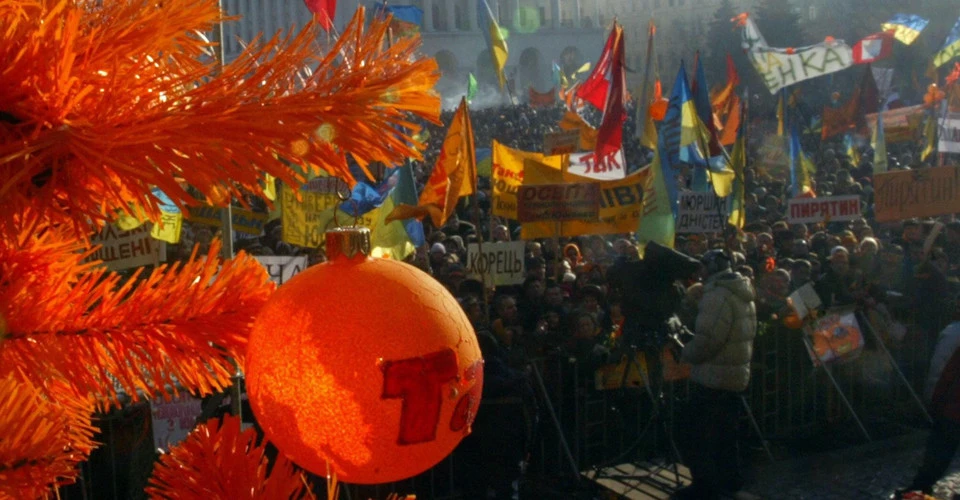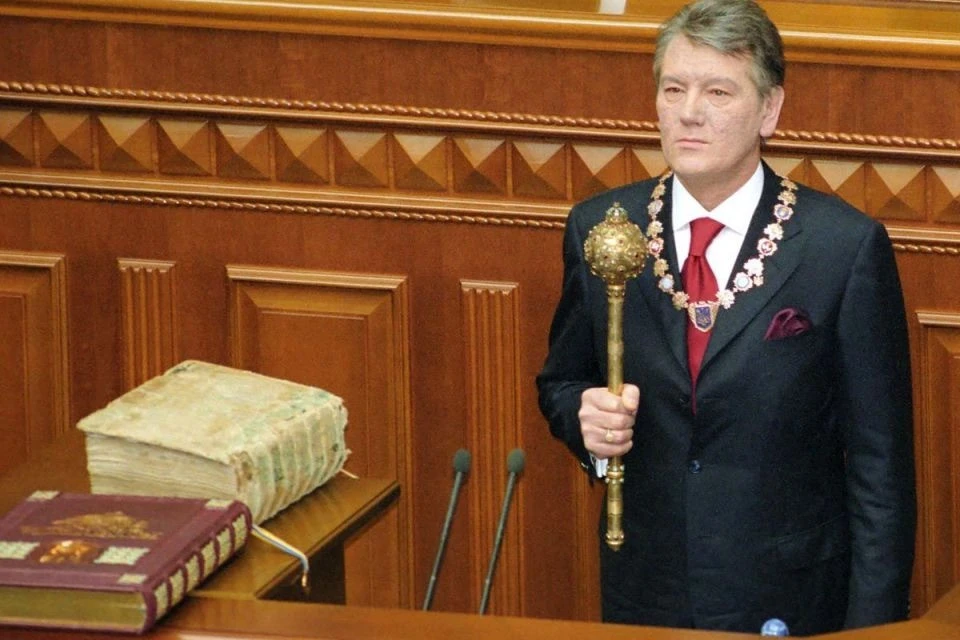
Ukraine commemorates 20 years since Orange Revolution on Day of Dignity and Freedom
Today, Ukrainians are celebrating the Day of Dignity and Freedom. This year marks the 20th anniversary of the Orange Revolution and the 11th anniversary of the Revolution of Dignity
The Orange Revolution, which began in November 2004, became one of the most important events in modern Ukrainian history. It demonstrated the willingness of Ukrainian society to defend its rights and resist injustice.
After the second round of the presidential election, on November 21, 2004, the Central Election Commission announced preliminary results based on 33% of the vote count, showing that then-Prime Minister Viktor Yanukovych was leading with 50% of the vote. However, exit polls indicated the opposite: Viktor Yushchenko was in the lead. This sparked widespread dissatisfaction, as numerous instances of election fraud became apparent to the Ukrainian people.
On the night of November 22, armored vehicles were deployed to Kyiv, security around the Central Election Commission and government buildings was increased, and the streets of the capital were filled with tens of thousands of internal troops and special forces. Meanwhile, Vladimir Putin hastily congratulated Yanukovych on his victory, which further heightened tensions.
By November 23, large-scale protests began in various cities across Ukraine. The epicenter of the protests was Independence Square in Kyiv, where hundreds of thousands of protesters from all over the country gathered, with estimates ranging from 100,000 to 500,000 people. They demanded fair elections and justice.

Escalation of 2004 Ukrainian presidential election crisis
The situation continued to escalate, and the overall tension only grew. On November 24, the Central Election Commission announced the final results, declaring Yanukovych the winner. In response, Yushchenko called for a nationwide strike and declared the beginning of the Orange Revolution. Protesters demanded that the government annul the election results.
The actions of the people's resistance did not go unnoticed. On November 25, the Supreme Court of Ukraine prohibited the publication of the official election results, which was an important step in the fight. On the same day, the National Salvation Committee was formed, consisting of key opposition politicians.
The confrontation took on a new dimension when, on November 26, a rally of about 60,000 people gathered in Kyiv to support Yanukovych. Meanwhile, destabilizing events began to unfold in eastern Ukraine, particularly in the Kharkiv and Luhansk regions, where local councils declared their intention to create autonomy. This further exacerbated the threat of territorial division within the country.
International intervention and triumph of democracy
On November 27, the Verkhovna Rada held an emergency special session attended by all members of parliament. As a result, a resolution was passed regarding the political crisis caused by the presidential elections. The parliament declared the results of the second round of voting invalid and voted to express no confidence in the Central Election Commission for its improper performance of duties under Ukrainian law. Despite the measures taken by the Verkhovna Rada, discussions continued in the east of the country, in parliamentary corridors, and at the local level about the introduction of autonomies and conducting referendums on the federalization of Ukraine.
At the end of November, international mediators, including representatives from the EU and NATO, joined the negotiations between the government and the opposition. They emphasized the importance of preserving Ukraine's unity, and most European leaders agreed with the people's position on the necessity of a repeat vote. "Ukraine's unity is vital," said the EU High Representative for Foreign Affairs and Security Policy, Javier Solana.
In early December, the Supreme Court of Ukraine recognized numerous violations during the elections and annulled the results of the second round, calling for a re-vote. This decision marked a turning point in the revolution. On December 8, the Verkhovna Rada passed significant amendments to the presidential election law to prevent fraud. A constitutional reform was also approved, reducing the president's powers in favor of parliament and the government.
Subsequently, on December 26, 2004, the re-run of the elections took place, in which Viktor Yushchenko won. A month later, he officially took the oath of office and became the President of Ukraine.

Unity and justice
The Orange Revolution became a symbol of national unity and the fight for democratic values. It temporarily compelled the political elite to consider public opinion, even though it did not lead to profound reforms.
The slogans that echoed during the Orange Revolution remain symbols of unity, determination, and belief in the triumph of justice. Phrases like "Together we are many, we cannot be defeated!" and "East and West together!" still hold great significance, as Russia continues its attempts to divide the Ukrainian people and create an artificial split that does not exist. Ukrainians are one nation and one country, despite efforts and ambitions to divide it.
The Freedom Day holiday was established by Viktor Yushchenko's decree on November 19, 2005 (No. 1619/2005) "to promote the ideals of freedom and democracy in Ukraine, to foster a sense of national dignity among citizens, and to acknowledge the historical significance of the revolutionary events of autumn 2004, which demonstrated the Ukrainian people's love of liberty and their commitment to freedom and democratic values." This holiday existed until 2010, when Viktor Yanukovych came to power and abolished it.
After the Revolution of Dignity and Yanukovych's escape to Russia in 2014, the next President of Ukraine, Petro Poroshenko, reinstated this commemorative date, giving it new symbolism and significance as the Day of Dignity and Freedom. This day honors two pivotal events in Ukrainian history: the Orange Revolution and the Revolution of Dignity in 2013/2014.
These historic events proved that Ukrainians are ready to defend freedom, even at the cost of their lives. They remind us of the power of unity, the importance of civic engagement, and the need to build a just and democratic state.
Most importantly, this is a time to honor the memory of those who gave their lives defending the ideals of freedom, dignity, and a civilized world, fighting for the future of their country and children. It serves as a reminder of the unbreakable spirit of Ukrainians, their readiness to unite for a common goal, and their determination to fight for the right to live in a just and democratic state.
President Volodymyr Zelenskyy, in his address to Ukrainians on the occasion of the Day of Dignity and Freedom, emphasized the importance of understanding the true cost of freedom for Ukraine. The head of state urged citizens to remember those who fought for the country's future and to honor their sacrifice. His message was shared in an official statement on the President’s Facebook page.
- News












































